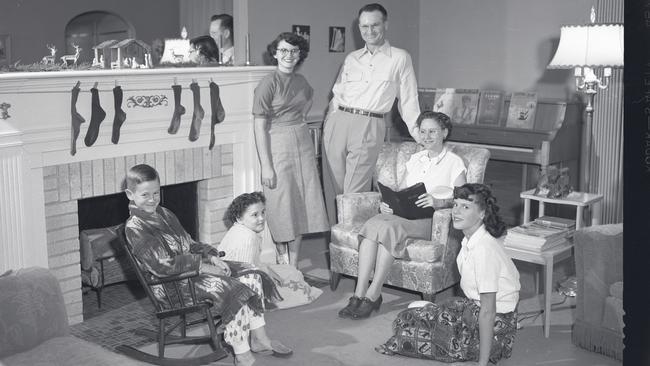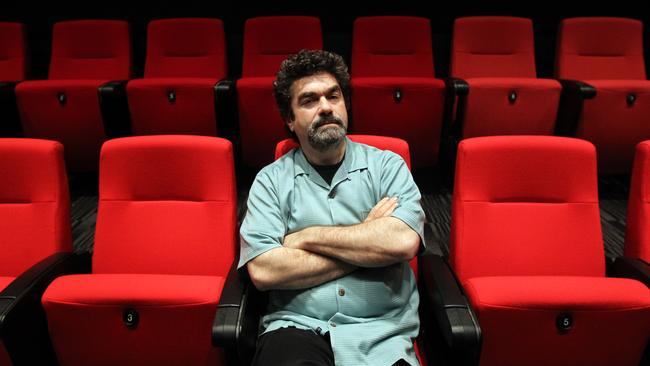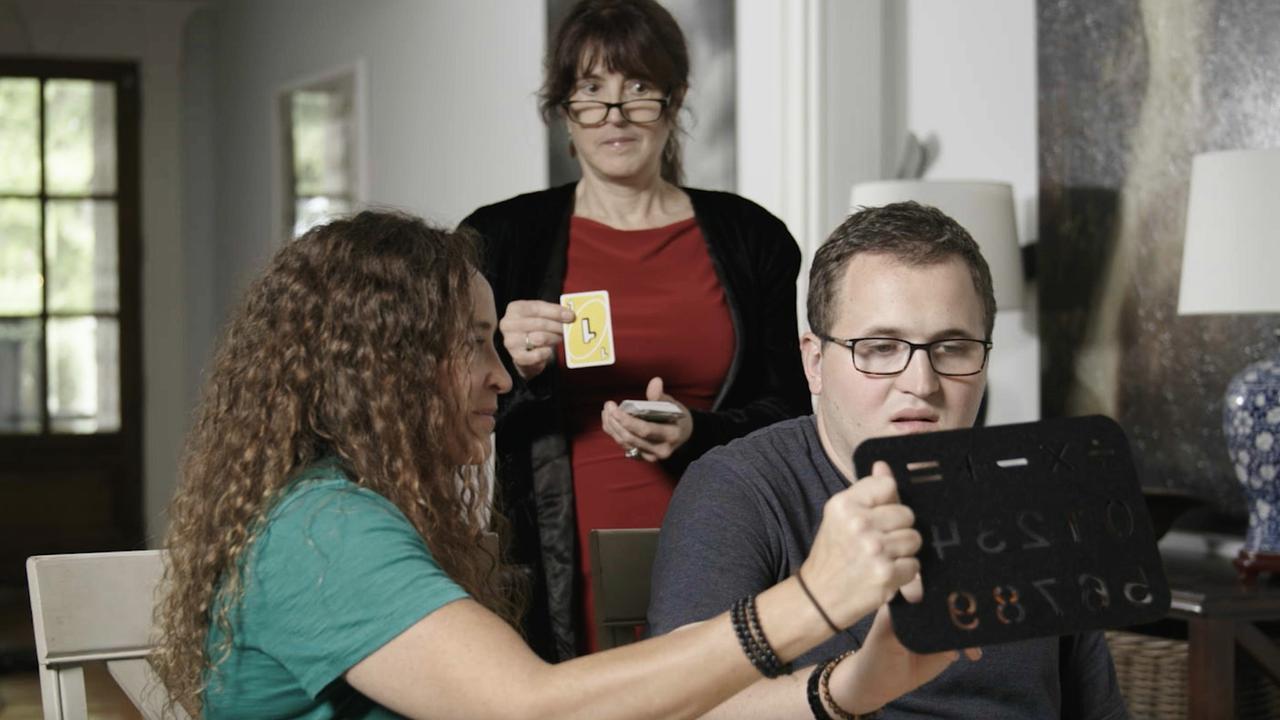Cold Blooded: The Clutter Family Murders puts the victims first
The slaughter of a family slaughtered and a literary classic addressing the event are re-examined in a new series coming to Foxtel.

On November 15, 1959, a quiet night in western Kansas, ex-cons Perry Smith and Dick Hickock broke into the home of prosperous farmer Herbert Clutter, ostensibly to commit burglary, then systematically slaughtered Clutter, his wife and their two teenage children with a shotgun. Perry and Hickock were searching for a safe rumoured to contain $10,000 — the intelligence had come from a fellow con — but they found no safe and murdered everyone present.
The recently paroled killers fled the scene with what amounted to pocket money, a small portable radio and a pair of binoculars. After a six-week road trip, they drove into Mexico briefly and were later captured in Las Vegas, leading to a Kansas trial and their eventual executions in 1965. Only the Clutters’ eldest daughters, Beverly and Eveanna, survived as they were staying elsewhere at the time.
Truman Capote’s 1966 account of the murders, so artfully documented in the biographical movie Capote, created the “nonfiction novel”, making its author a celebrity and also, somewhat weirdly, creating literary heroes out of the two killers. And Richard Brooks’s version of the book, with its stark psychological realism, was one of the first filmic true-crime investigations, now a staple of TV.
I can still remember the sense of dread I felt on first seeing it, the way Brooks’s florid tone and Conrad Hall’s wide-screen black-and-white cinematography gave such an emotional edge to the terrible nihilistic story.
In Cold Blood was one of Hall’s 10 Oscar nominations (he won three times but lost in 1967, to Bonnie & Clyde), and his work is brilliant, bleak, claustrophobic, full of foreboding.
Hall shot the murders in the actual Clutter house using only the light of a torch, the windows blacked out to create night. For even greater authenticity, Brooks re-enacted the trial scene at the Finney County Courthouse in Garden City, where the actual trial had taken place, and he used the actual jury members who had convicted the killers.
Hall’s expressionistic shot of Smith, played so convincingly by Robert Blake, looking out of a window before being sent to the gallows, the rain seemingly running down his face instead of tears, is one of cinema’s great images.
And now, with the premiere of Oscar-nominated, Emmy-winning documentary filmmaker Joe Berlinger’s Sundance TV docuseries Cold Blooded: The Clutter Family Murders, coming this month to Foxtel’s CI channel, we have the opportunity to learn more about the Clutters, their surviving family members and the many other people who still live with the aftermath of the brutal crime nearly 60 years later on.
“It’s the story that just won’t go away,” says surviving Clutter daughter Eveanna, who was married at the time of the murders. She participated in Berlinger’s series, she says, because she wanted to correct various misconceptions about her family resulting from Capote’s book and Brooks’s film. “Who was grandma?” she asks. “Who was grandpa?”
The children of the eldest Clutter daughters spoke on condition of anonymity. And it took months to convince family members, who view the book and movie as sympathetic to the murderers, to take part. Their tragedy, Berlinger believes, was used in the service of creating a literary movement, the so-called nonfiction novel, which synthesised fiction techniques with journalism and launched the true-crime genre, the beginnings of which he was determined to investigate and morally evaluate.
“I’m glad the literary movement exists,” Berlinger says. “But we must be reminded of the price that some people paid.”
As he shows, this was a shocking event that no one in the local community spoke about — though he notes that as they maintained their silence, the town’s hardware stores quickly ran out of locks.
“Nobody talked about it, nobody,” Clutter cousin Diana Edwards says. “My family never talked about it. My mother never mentioned it. It was too painful — and I realised there is a period of time where something is literally unspeakable. It was unspeakable.”
She says the close-knit, highly religious family, active in the First Methodist Church, was simply distraught: “We forgot how to pray.” (Much of Edwards’s commentary is not only chilling but ethereally beautiful, large portions of it read from a diary she kept that is superbly written.)

Berlinger in his own way creates in this kaleidoscopic narrative documentary series an imaginative conception of reality in his search for a deeper truth about the terrible murders, believing the price paid by Capote’s success was the way the Clutter family historically has been treated as a side note, either misrepresented or not represented at all.
“They generally felt very violated by how Capote presented everything, and they never heard from him after the book came out,” Berlinger says. “They felt, the family felt, burned by the experience. So I don’t think they were waiting to tell their side of the story. But I think knowing that their side of the story was going to be told by competent people who have integrity, I think that helped them to decide to reluctantly participate.”
The documentary also examines the role played by Capote, who makes frequent appearances in archival footage; the veracity of his narrative has been seriously questioned in recent times. “Years before a president-elect screamed ‘fake news’ during a press conference, bookstores were placing In Cold Blood in the fiction section, foreshadowing distrust in journalism and the media,” writer Rae Nudson wrote recently. “Capote’s decisions throughout the research and writing of the book often mirror those people currently in power, who declare self-sacrifice while chasing their own self-interest.” (Many have suggested over the years that Capote wrote the book the police and justice authorities wanted him to write.)
When George Plimpton questioned Capote in January 1966 as to whether he had used any fictional devices in the book, he responded: “One doesn’t spend almost six years on a book, the point of which is factual accuracy, and then give way to minor distortions.” But with misgivings coming from many quarters over the years, it’s hard to doubt he cut a few corners in his reporting and sugar-coated the material where it suited him.
“This was a unique opportunity to kind of pull back the lens on a story that has affected this family for decades, that was kind of the end of an age of innocence in that town where you could leave your door unlocked,” Berlinger told Yahoo Entertainment’s Kimberly Potts. “But we only know about this crime because of this book, and this book told the story in a way that, I think, added to the family’s pain.”
Meticulously researched and incredibly detailed, this series is simply captivating. Berlinger makes extensive use of ghostly archival video, crime scene and family photos, and audio police interrogations of the killers, beginning with an attention-grabbing montage of press cuttings, grabs of interviews from the past and the present strikingly juxtaposed, and audio of Hickock from prison, tied together with stately, silent aerial shots of deserted Holcomb streets. He inserts stills of Capote at various sites around the town preparing the background for his book, and the sequence ends with a voiceover: “They took away from a community a family. Why? It couldn’t have just been money.”
Investigators, friends and relatives of the victims also speak for the first time, and some of the first-person accounts are horrifying and compelling. Berlinger only includes interviews with people connected to the family or investigators. “My guiding principle was we don’t want outside ‘experts’,” he says.
Berlinger has said he wants to be a good storyteller and not only make things dramatically satisfying but also “shine a light on injustice”. And Cold Blooded brilliantly tells the story of how the tragedy of a murdered family was exploited in the service of creating a literary monument. And while Berlinger demonstrates at the same time his gratitude for the fact of the literary and cinematic movement that followed the publication of In Cold Blood, such an influence on his own career, he compassionately reminds us of the true cost of this tragic event.
Cold Blooded: The Clutter Family Murders
From Wednesday, October 31, 8.30pm, CI.



